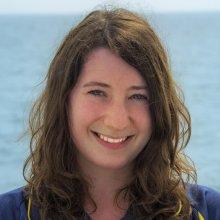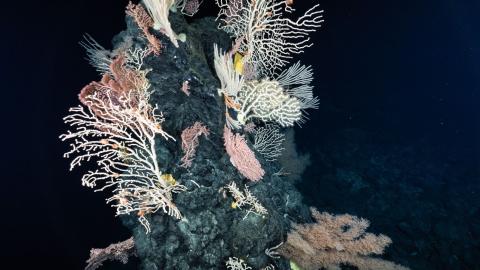
Fanny Girard
Tell us about your work/ research. What kinds of things do you do?
I am a benthic ecologist with a fascination for the deep sea. Although the deep ocean represents the largest habitat on our planet, it is also one of the least known. Therefore, I made it my mission to improve our understanding of deep-sea ecosystems and help protect them from human activities and climate change. I am broadly interested in how deep-sea organisms interact with their physical environment, and specifically, how environmental variability through space and time affects the distribution and biological processes of keystone species such as deep-sea corals. To carry out this work, I have been using a variety of techniques including high-resolution imaging (photography and video), biological/environmental sampling and seafloor mapping using submersibles and automated underwater vehicles. Sailing on the Nautilus provides a unique opportunity to fill essential knowledge gaps on ecologically valuable, but fragile, deep-sea ecosystems in poorly studied areas such as remote islands of the central Pacific.
What sparked your initial interest in your career?
Growing up on the Mediterranean coast I have always been drawn to the sea. I started scuba diving and sailing at a very young age and always felt “at home” near the ocean. However, it was only after meeting marine scientists at the end of my undergraduate degree that I realized that the ocean could be the focus of my career. This led me to do a Masters in marine ecology, and eventually to take a deep-sea biology class. I got completely hooked! In a way, this one class started my career as a deep-sea biologist.
Who influenced you or encouraged you the most?
This is a tough question. While many people have influenced me, my mentors likely had the largest impact on my career. I have been extremely lucky to have had incredible mentors who supported me throughout my education and career. They provided me with many opportunities and, even more importantly, encouraged me and made me believe in myself.
What element of your work/ study do you think is the most fascinating?
What I love the most about my job is that we are making new discoveries almost every day. Because so little is known about the deep ocean, every submersible dive leads to discoveries and new questions to answer. Whether we are trying to answer important scientific questions or exploring new places where no one has ever been, every day is an adventure.
How did you get involved with Ocean Exploration Trust? How did you become part of the expedition team?
I sailed on the Nautilus for the first time in 2014 and then 2015 to carry out monitoring work in the Gulf of Mexico as part of my PhD. At the time, I was at the very beginning of my career, and these were some of my first research expeditions. I had an incredible experience onboard the Nautilus, and I am excited to have another opportunity to join a Nautilus expedition almost 10 years later.
What other jobs led you to your current career?
In addition to research, I also worked in environmental policy for a couple of years. I have always been interested in conservation and applied research to inform resource management strategies. In my role as a scientific officer at the Museum of National History in Paris I worked closely with policy makers (French Ministry of Environment, European Commission), field conservationists and other scientists and learned how to communicate with a broad audience. As scientists, we are not always trained to effectively convey the outcome of our research to end users and policy makers. This job thus helped me acquire important communication skills needed to achieve one of my career goals: protect deep-sea vulnerable marine ecosystems.
What are your degrees and certifications?
I earned a PhD in Marine Biology from the Pennsylvania State University, a MSc in Marine Ecology from the University of Western Brittany (France) and BS in Biology from Sorbonne University (France).
What are your hobbies?
When I am not working you will likely find me dancing! Although I do not discriminate between dance styles, I am particularly fond of salsa. I am also into any type of outdoor activity including running, hiking and scuba diving.
What advice would you give someone who wants to have a career like yours?
Follow your passion and don’t let anything or anyone discourage you from doing what you love. Marine science is a competitive field, and it can be tempting to give up after facing failures and rejections on the job market. However, one thing I have learned over the years is that when one door closes, many others open. Many paths can lead to a successful career in marine science and persistence is key. To give a personal example, I was out of science for a few years during the pandemic and almost gave up on my scientific career. Fortunately, I didn’t and even came back stronger from this experience. So my advice? Be persistent, don’t give up and be ready to grab opportunities as they come to you. And most important of all, regardless of the outcome enjoy the journey!
"My interest in ocean exploration started after I dove for the first time at 11 years old. I am now very excited about sailing aboard Nautilus as it will give me the opportunity to take part in great discoveries."
Expeditions
Fanny participated in the following Ocean Exploration Trust expeditions:

